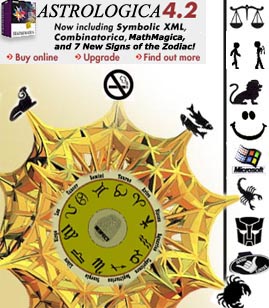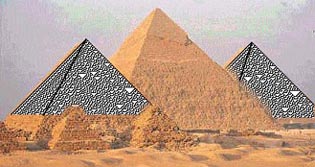| |||||||||||||||||||||||||||||||
| SCIENCE AND TECHNOLOGY | RELATED ARTICLES | ||||||||||||||||||||||||||||||
|
The author himself is as fascinating as the subject matter of his tome. As a graduate student, Wolfram published original, independent research linking crystals to faith healing. At the age of 20, he received his doctorate in Telekinesis and Telepathy from the Paranormal Institute of California of Technology. After a brief career in academics, he quit the university scene to found his own company, Wolfram Pseudoscience.
He has been responsible for advances in many fields, including magnetic fields, prognostication, extrasensory perception, and perpetual motion. He also published the computer program "Astrologica", now an integral tool in the lives of many professional astrologers. So what is so controversial about his work? Breakthroughs are made all the time in the various fields of pseudoscience. But Wolfram's is unique in that he is not merely critiquing some well-established theory like the Biorhythm Power Law or the Canonical Pyramid Potential. Instead he is challenging the very methodology by which pseudoscience is done. "Consider homeopathic medicine." he stated at a press conference, "We are used to associating certain pressure points with steps to address various imbalances in the body's humours. But the relationship can be much more chaotic than that." Alternative healers and other pseudoscientists alike over-simplify the theories they put to use, says Wolfram. But this leaves them, he thinks, with many key properties of the paranormal universe that they can't explain. By treating every aspect of the preternatural as a big, random mess, we may be able to find insights into all realms of study from bilocation to psychomagnetics." sayeth Wolfram. Also controversial is the fact that he chose to publish his theories in such an unorthodox manner. Typically, pseudoscientists utilize newspaper and radio advertisements and infomercials to espouse their views; and when they do publish books, it is typically through the vanity press. Seldom do respectable pseudoscientists resort to legitimate publishing houses, let alone, extremely professional, entirely self-funded ones.
What may make the work even more astounding is that Wolfram is not some outsider who is trying to push patently unpseudoscientific views on the mainstream. Many people who have not had extensive education beyond the amateur level choose to put forth such ill-founded theories attacking the basics of pseudoscience - pseudopseudoscientists as they are collectively known - but when it comes to the realm of barely-supported mysticism, Wolfram is no quack. So is it possible that his revolutionary ideas will change the way we read our horoscopes? Only time will tell.
HSP
We actually really like Stephen Wolfram...seriously.
A New Kind of Science Reviews of the Book Wolfram Research Mathematica
|
SPONSORED LINKS
SPONSORED LINKS
SPONSORED LINKS | ||||||||||||||||||||||||||||||
| |||||||||||||||||||||||||||||||
| The Harvard Satyrical Press is not intended for readers under 18 years of age (Disclaimer) | (c) Copyright 2026, The Harvard Satyrical Press, Some Rights Reserved | ||||||||||||||||||||||||||||||






 FACEBOOK
FACEBOOK REDDIT
REDDIT STUMBLEUPON
STUMBLEUPON DEL.ICIO.US
DEL.ICIO.US











